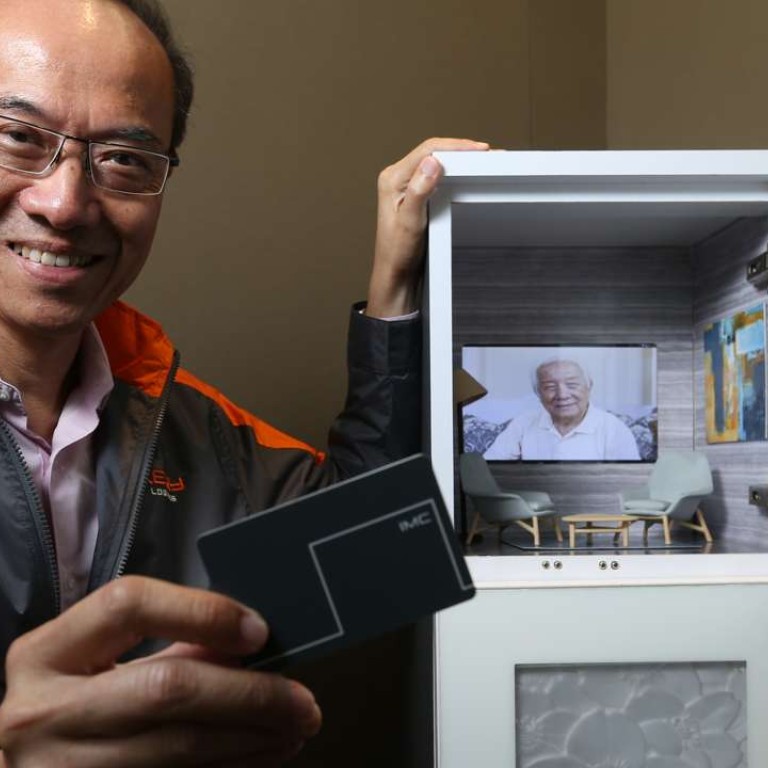
Can a logistics giant modernise Hong Kong burials? Controversial project part of plan to bring competition to columbarium industry
George Yeo, chairman of Kerry Logistics, hopes its Island Memorial Centre, if approved, will solve problems that plague the industry
Hong Kong’s private columbarium market desperately needs competition to help meet increasing demand and modernise industry standards, said the head of a logistics giant awaiting approval to rezone and build a controversial 82,000-niche “state-of-the-art” facility in Chai Wan.
Kerry Logistics is hoping the Town Planning Board will approve a proposal that the company thinks will open up the industry “bottleneck” and incentivise more players to enter the market.
“If we succeed in doing this, the problem of inadequate supply should be solved in Hong Kong over time,” Kerry Logistics chairman George Yeo Yong-boon told the Post.
But uncertainty lingers as a draft legislation for a licensing regime for private columbarium operators awaits passage in the Legislative Council.
Under the bill, only licensed columbariums can trade in niche places, threatening to put thousands of unauthorised private operators in limbo.
“This is a change that is absolutely necessary,” Yeo said.
“If approved, future [modern] columbariums will be built in Hong Kong and these columbariums will meet the need for niches in Hong Kong,” he added.
Conceptualised nine years ago, the company’s first choice had been to redevelop a warehouse site it owned in Fanling, but a consultant’s report ruled that this would run into “huge resistance” and unlikely to be approved by the board, Yeo said.
The Fanling site was dropped from its list and the Kerry Warehouse site in Chai Wan was selected as the alternative.
Opposition to this site however, remains fervent. Yeo acknowledged the project, though not the company’s toughest, had been“politically sensitive” and one requiring careful and proper handling and consultation.
I’ve been in politics for 23 years in Singapore. The key is you must respect local concerns and listen very carefully ... You can never please everybody but you should be able to win over the majority
“We don’t want this project to be a problem for our overall reputation as a logistics company,” Yeo, who served as Singapore’s minister of foreign affairs from 2004 to 2011, added.
“This must be a project ... that will enhance our reputation, not cause it to diminish.”
But those against the plan are not convinced – a contingent of residents and district councillors are vowing to block the project at all costs citing reasons ranging from congestion and traffic during the Ching Ming and Chung Yeung festivals, to the sense of unease of having such a facility in their neighbourhood.
The Federation of Trade Unions threatened to lodge a judicial review if the plan is approved. Lawmaker Aron Kwok Wai-keung last week said the plan “blatantly goes against what Eastern district residents want”.
District councillor Wong Kwok-hing said “there could be no discussion at all” as no solutions would improve the already chaotic traffic problems during grave-sweeping festivals.
Cape Collinson Crematorium in Chai Wan currently provides more than 60,000 niches and will have an additional 25,000 built by 2020.
“Some 70 to 80 per cent of people still oppose it and the reason is simple: there are more niche spaces than people in Chai Wan now,” Tsui Tak councillor Lee Chun-keung from the Liberal Party, had said.
Asked whether these are a “not-in-my-backyard” – also known as ‘nimby’ – attitude, Yeo said: “I don’t quite like this characterisation of the word ‘nimby’.”
“I always ask myself, if I were someone living there, I wouldn’t like someone else dismissing my concern as a ‘nimby’ concern, as if I’m being unreasonable [and negative].
A lot of columbariums in Taiwan are built to serve the community, they have coffee shops in the lobby and children’s play areas. They’ve become a place for family gatherings
“I’ve been in politics for 23 years in Singapore. The key is you must respect local concerns and listen very carefully ... You can never please everybody but you should be able to win over the majority.”
Yeo believed the company had done its best to meet these concerns. Shuttle buses, ferry services and a high-tech pre-appointment system had been planned to mitigate congestion.
Most residential areas were “450 to 500 metres away” and well buffered by an industrial estate, water basin and sports ground, Yeo said.
Meanwhile, a survey released on Sunday by Shue Yan University showed 38 per cent of 1,007 local residents who lived within a kilometre of the proposed facility opposed the project, compared to 62 per cent who had no objection. About 40 per cent said they would consider the discounted niches.
Yeo said: “This is not a last minute concession. In fact this has been internally discussed for quite some time but we needed to operationalise it in a sensible way.”
“We hope to be able to persuade [district councillors] that this is not just a Hong Kong facility, but a local facility.”
Because of the lack of a “competitive dynamic”, Kerry Logistics claimed the private sector in Hong Kong is decades behind Taiwan, Malaysia and Singapore not only in quantity but quality and design.
“A lot of columbariums in Taiwan are built to serve the community, they have coffee shops in the lobby and children’s play areas. They’ve become a place for family gatherings,” Kerry Logistics managing director, William Ma Wing-kai, said.
The Island Memorial Centre is currently the only columbarium project in Kerry’s pipeline. As to whether it wants to be a player in the market, Yeo said: “We will have to see and judge the conditions.
“This is not our main business, but it is a good business. We can serve a public need well and we may continue to do so.”

